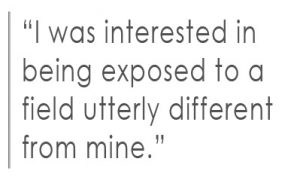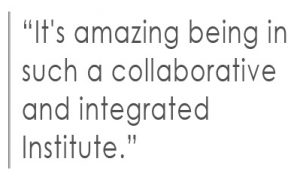It’s a quintessential summer day—92 degrees and sunny without a cloud in the sky—but instead of heading to the beach, this group of motivated students is headed to Technology Square in Cambridge, Massachusetts, to work in a lab at the Ragon Institute of Massachusetts General Hospital, MIT, and Harvard.
No small feat, the highly competitive Ragon Institute Summer Student Program, directed by Ragon Principal Investigator Dr. Sylvie Le Gall, accepts 20-25 students from all over the world to work full time at the Ragon Institute for the summer on an independent research project related to immunology.

Students apply directly to the summer program via the application instructions on the Ragon Institute’s website or are referred from programs linked to the Ragon Institute at Massachusetts General Hospital, Harvard Medical School, or the Howard Hughes Medical Institute.
Coming from widely diverse backgrounds, this year’s class of summer students calls the United States, France, Côte d’Ivoire, Zimbabwe, Nigeria, and China home, and contains a mix of highly motivated high school, undergraduate, masters, and medical students.
In line with the Ragon Institute’s principal of creating non-traditional partnerships between experts with different yet complimentary backgrounds, many summer students have strong backgrounds in biology and biochemistry, but others have extensive education in child study and human development, neuroscience, speech, language, and hearing sciences, computational and applied mathematics, electrical engineering, and epidemiology.
Adaeze Adigwe, a rising third year student in electrical engineering at Northeastern University, is working with Ragon computational biologist Dr. Wen-Han Yu this summer on applying a range of computational algorithm models to identify key biomarkers that drive protection or infection from HIV using data from several vaccine studies.
“I was interested in being exposed to a field utterly different from mine,” says Adaeze, “and was curious about learning about research done on infectious diseases which is a particularly a huge plight in Africa where I am from. I have been really amazed by the efforts exercised by every member at Ragon…. It’s been great seeing how my programming skills and those I learn on the job [are] useful to interpret and make sense of all the data.”
 Before attending the Ragon Institute, many students worked in labs or conducted previous research projects on subjects varying from vascular surgery and gastroenterology to sociology and bioorganic chemistry.
Before attending the Ragon Institute, many students worked in labs or conducted previous research projects on subjects varying from vascular surgery and gastroenterology to sociology and bioorganic chemistry.
Alina Razak is a rising senior at Boston University and conducts undergraduate research at the BU Center for Regenerative Medicine. Before coming to the Ragon Institute, Alina’s projects focused on the scale-up and proliferation of mouse embryonic stem cells in a spinner flask system as they differentiate into mature lung and thyroid cells. At the Ragon Institute, Alina works in the Lingwood Lab focusing on B cell antibody responses to influenza using non-Sanger-based high-throughput DNA sequencing technologies (Next-gen sequencing).
“I applied to the Ragon Summer Program because I am very passionate about the intersections between scientific research, medicine, and public health,” says Alina, “It’s amazing being in such a collaborative and integrated Institute to work on decoding the immune system. I am enjoying hearing from leading experts in the field and applying what I’ve learned in undergraduate classes to my research.”
Each student participating in the Ragon Institute Summer Program is assigned a faculty advisor matched to them by their area of interest and is assigned a hands-on, short-term research project customized to the student’s research level. After receiving training specific to each research project, students write their own protocols and perform experiments to address the essential question of their research topic. At the end of their time at the Ragon Institute, students are required to give an oral and written presentation of their results.
In addition to bench science work, summer students also attend weekly lunches hosted by faculty members who present the research being done in his or her lab, weekly immunology lectures given by postdoc fellows and PhD students, and additional weekly lectures on various topics including biostatistics, scientific writing, novel technologies at Ragon, and clinical work in the field.
 Mathias Buytaert, a masters student in biotechnology and chemical engineering at Ecole Supérieure de Biotechnologie Strasbourg and Ecole européenne de chimie polymères et matériaux de Strasbourg in France, is working in the lab of Dr. Sylvie Le Gall studying the degradation profiles of HIV peptides and the different epitopes that are preferentially produced and presented by MHC I molecules on the surface of HIV infected cells.
Mathias Buytaert, a masters student in biotechnology and chemical engineering at Ecole Supérieure de Biotechnologie Strasbourg and Ecole européenne de chimie polymères et matériaux de Strasbourg in France, is working in the lab of Dr. Sylvie Le Gall studying the degradation profiles of HIV peptides and the different epitopes that are preferentially produced and presented by MHC I molecules on the surface of HIV infected cells.
“I am really interested in Immunology and the Ragon is one of the top institutes in this field,” says Mathias, “It was a good way for me to experience fundamental research in a prestigious academic environment. Moreover, the Ragon Summer Program gives me the opportunity to broaden my knowledge in immunology thanks to the numerous conferences and lectures given on a wide variety of subjects.”
Georges Cisse grew up on the Ivory Coast and now attends Notre Dame University where he conducts undergraduate research on mosquito vectors. Before arriving at the Ragon Institute, Georges traveled to Durban, South Africa, the epicenter of the HIV/AIDS epidemic to study HIV at the University of Kwazulu-Natal as part of the HIV Pathogenesis Program. This summer, through the Africa Careers Network portal of the African Leadership Academy Georges was placed at the Ragon Institute to help optimize an assay to visualize various components of lymph node tissues such as the locations of specific immune cells and cytokines.
For many, the Ragon Institute means more than just first-hand research experience. Rachel Lorenc a rising freshman at Johns Hopkins University joined the program because she hopes to specialize in TB/HIV co-infection and participate in humanitarian medicine efforts in developing nations by helping to create an effective and economic tuberculosis vaccine.

“My work in the Barczak Lab is my first exposure to TB research, and it’s a great opportunity to learn more about the field I’m pursuing,” says Rachel.
For others like Itai Muzhingi, a rising junior at Amherst College, their reasons for participating in the Ragon Summer Program hit closer to home. “I have always wanted to do HIV research because of the impact that the disease has had in my community,” says Itai, “and I am learning more about the destructive nature of the virus and potential ways that the immune system may be stimulated to combat the virus.”
Whether its pioneering new DNA recombineering protocols, investigating the HIV reservoir in brain tissue, using the cutting edge technique of CRISPR/Cas9 to study the non-cytotoxic response of CD8+ T cells, or analyzing metadata on behaviors linked to HIV transmission, these bright young minds have plenty to offer to the world of biomedical research.
About Liam Fitzgerald
 Liam is a lifelong resident of Boston and is currently enrolled at the University of Massachusetts in Amherst majoring in Biochemistry and Molecular Biology on a pre-medical track. In his freshman year at UMass, Liam was elected the House Council President of the UMass Northeast residential area and was selected as one of fifteen members of the inaugural Biology Major Advisory Committee. Last year, Liam authored and published a book titled Through the Eyes of Our Neighbors which explores the differing identities of Boston as it pertains to people of different racial groups, socioeconomic classes, and nationalities through portraits and interviews collected from over 70 people. This summer, Liam is working full time at the Ragon Institute of Mass General, MIT, and Harvard alongside Sarah Sullivan and Dr. Sylvie Le Gall as a liaison between the research laboratories and communications department. For personal inquiries, email Liam at [email protected].
Liam is a lifelong resident of Boston and is currently enrolled at the University of Massachusetts in Amherst majoring in Biochemistry and Molecular Biology on a pre-medical track. In his freshman year at UMass, Liam was elected the House Council President of the UMass Northeast residential area and was selected as one of fifteen members of the inaugural Biology Major Advisory Committee. Last year, Liam authored and published a book titled Through the Eyes of Our Neighbors which explores the differing identities of Boston as it pertains to people of different racial groups, socioeconomic classes, and nationalities through portraits and interviews collected from over 70 people. This summer, Liam is working full time at the Ragon Institute of Mass General, MIT, and Harvard alongside Sarah Sullivan and Dr. Sylvie Le Gall as a liaison between the research laboratories and communications department. For personal inquiries, email Liam at [email protected].


 Ragon Institute
Ragon Institute 